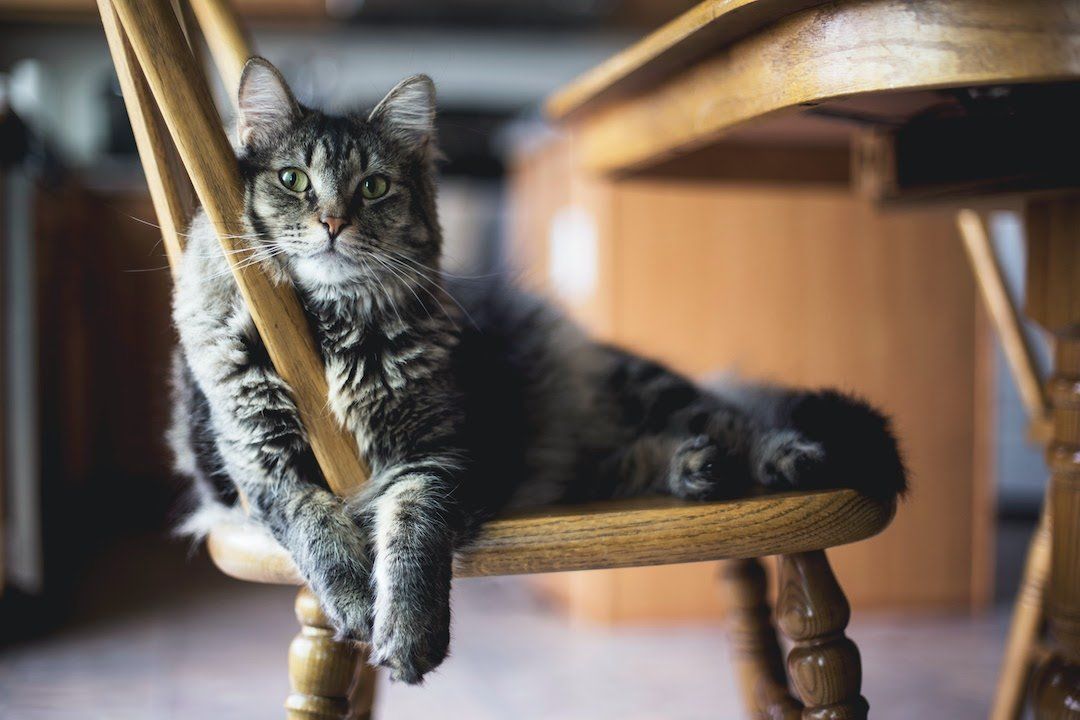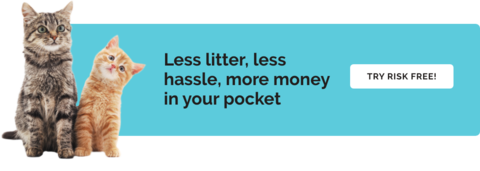
Like other animals, cats also experience health problems, and constipation is one of them. Cat constipation is no fun for anyone! If your kitty is struggling to produce good, healthy stool, the chances are that they are suffering from cat constipation and it is crucial to pay attention to these early signs. There are many causes and symptoms of kitten constipation. Let's look at what can cause constipation, its symptoms, and what you can do if your cat struggles to go #2.
What is Cat Constipation?
Cat constipation is when a cat has difficulty passing stool, as well as infrequent bowel movement. This can happen for several reasons (which we will dive into later), but it isn’t fun for kitty or kitty parent.
In addition to the lack of bowel movements, cat constipation can also cause hard stools because they have been retained longer in the cat’s colon.
What Causes Constipation in Cats?

There are many causes of cat constipation and determining the cause is the first step in helping your furry friend feel better. Let’s look at some of the most common causes and signs of constipation in cats:
Behavioral Concerns
One of the first causes of cat constipation is behavioral concerns. This happens when the litter box situation is less than ideal for your kitty. This could include having too dirty of a litter box, having a litter they don’t like, or having multiple cats competing for the same litter box. If your cat has had a bad experience going to the bathroom, they might not want to go as easily, which can therefore cause urinary issues and constipation. Follow these cat litter box tips and tricks to improve your kitty’s bathroom experience.
In addition to these behavioral considerations, there are also some neurological considerations that can plague kitties and cause constipation. For example, if the nerves that control the bowel are damaged, it can make going number #2 painful and difficult.
Pain
Constipation is a fairly common problem, especially in older cats. One reason that older cats might experience constipation more frequently is that they might have pain or discomfort associated with going #2. For example, if your cat suffers from osteoarthritis, straining to defecate can be painful.
In addition, pain in the rectum or colon can also cause constipation. This can happen when the colon's lining is irritated or if your kitty has an abscess or skin infection near their anus. That can’t feel good!
Obstruction
Some cats may develop an obstruction of the colon, making it difficult to have a bowel movement. For example, if you adopted a kitty that had a fractured pelvis from being hit by a car in one of their nine lives, this healing can cause the pelvic canal to become more narrow.
Dehydration
One of the most common causes of constipation in cats is dehydration. Cats usually don’t drink a lot of water and get the majority of their moisture from their diet. If you’re feeding your cat a diet that doesn’t have enough moisture, this can cause their stools to be hard and difficult to pass. It’s very important to keep your cat well-hydrated, both for treating feline constipation as well as for preventing other issues, such as UTIs and kidney disease. Make sure you know how to tell if your cat has a UTI.
Change in Diet
Of course, a change in diet can also cause constipation in cats as their stomachs and digestive tract get used to a new food. When introducing a new food, always do it slowly so your cat can get used to it. Start by replacing ¼ of their old food with the new food, then slowly work your way up to ½ new food, half old food, then eventually ¾ new food, and once they are adjusted, you can switch them completely. This helps prevent any bad reactions or gastrointestinal problems.
Cat Constipation Symptoms
Now that we understand what can cause constipation in cats, let’s look at some of the most common symptoms so you know what to look for and when to call your vet.
Here are some of the most common cat constipation symptoms:
- Difficulty passing feces
- Straining to defecate
- Decreased defecation frequency
- Small, hard, dry feces
- Increased attempts to go to the bathroom with nothing coming out
- Loss of appetite
- Vomiting
Another important cat constipation symptom is called megacolon. This constipation symptom occurs when a cat has had consistent constipation issues for a long period of time, which can cause obstipation, or the inability to pass any feces at all. All of these incidents can irritate the colon, which can cause the colon to become enlarged.
In addition to being caused by prolonged bouts of constipation, megacolon can also occur for no real reason. This is called an idiopathic megacolon and prevents the muscle of the colon wall from contracting properly.
Treating Constipation in Cats
Luckily, the prognosis of constipation in cats is generally good, and there are some pretty simple changes you can make at home to make sure your kitty is healthy and producing good quality stools.Of course, preventing yourcat’s constipation is also important. Be mindful of not just yourcat’s diet, but also his or her bowel habits. If your cat is sitting in the litter box, for example, then you may want to reach out to a vet.
Litter Box Management
The first thing you should do to encourage healthy litter box behavior is to make sure that the litter boxes are always clean and that you have enough for multiple cats. If you have multiple cats, you should have one additional litter box for the number of cats you have. For example, if you have two cats you should have three litter boxes. In addition, you should choose a litter that your cat enjoys using. Some cats have preferences for different types ofcat litter, so you should test to see which one your cat likes best.
Learn more aboutcommon cat health issues and how to identify them.
Tired of your home smelling like you have a cat?
15% off PrettyLitter
Try it today Use code: PRETTYBLOG
Tired of your home smelling like you have a cat?
20% off PrettyLitter
Use code: PRETTYBLOG
Good Diet and Hydration
Next, you should make sure that you are feeding your cat a protein-rich diet that has enough moisture. This may include feeding both dry and wet food. You can also supplement your cat’s hydration with liquid treats. If they refuse the treats and food, make sure you understand why is my cat not eating?
If your cat suffers from chronic constipation, your veterinarian may recommend a prescription diet focused on improving your cat’s bowel movements, as well as at-home remedies for additional relief.
Medication
In more severe cases of constipation, your veterinarian may recommend a medication to help. This could include laxatives or an enema. There are a few common types of laxatives, including:
Lubricant laxatives (lubricates the colon)- Emollient laxatives (promotes water retention in feces)
- Osmotic laxatives (draws water into the feces)
- Stimulant laxatives (stimulates the contraction of the muscle in the colon)
Surgery
In the most serious cases, your vet may recommend surgery to manage your cat’s constipation. The most common surgery to help is called a subtotal colectomy and involves removing most of the colon. The long-term impact of this surgery is usually very good for cats that previously suffered from constipation.
Conclusion
Constipation in cats can happen for several reasons, including anything from a change in diet to stress to pain or a genetic issue. The most common cat constipation symptoms include straining to defecate and infrequent bowel movements. While many cases of constipation can be treated with proper litter box maintenance and good hydration and diet, some serious cases may require surgery or indicate the presence an underlying disease. When you suspect your cat has chronic constipation, consult a vet as soon as you can.


Follow Us